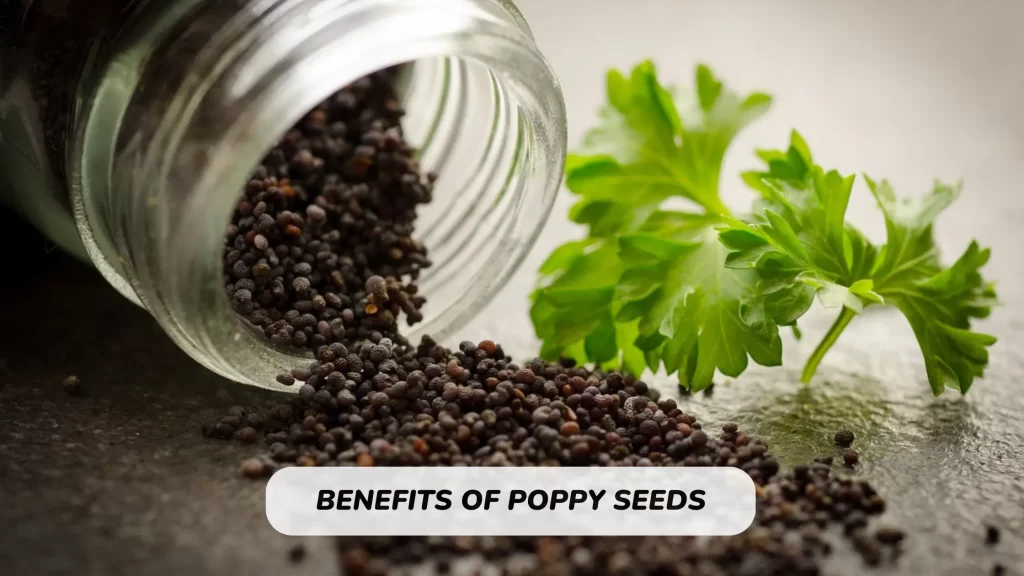Poppy seeds, derived from the opium poppy plant, have been used for culinary and medicinal purposes for centuries. These tiny seeds not only add a delightful nutty flavor and texture to various dishes but also offer several health benefits. Let’s explore some of the benefits of poppy seeds:
Explore of Benefits of poppy seeds
Nutrient-Rich: Poppy seeds are packed with essential nutrients, including dietary fiber, protein, healthy fats, calcium, iron, magnesium, phosphorus, and zinc. Incorporating them into your diet can help support overall nutritional well-being.
Digestive Health: The dietary fiber content in poppy seeds promotes healthy digestion and aids in preventing constipation. It adds bulk to the stool, facilitating regular bowel movements and maintaining a healthy digestive system.
Nutritional Support for Bone Health: Poppy seeds contain minerals like calcium, phosphorus, and magnesium, which are vital for maintaining strong and healthy bones. Including these seeds in your diet can contribute to bone health and help prevent conditions like osteoporosis.
Boosts Energy Levels: Poppy seeds are a good source of carbohydrates and healthy fats, providing a quick and sustained energy boost. They can be particularly beneficial for athletes or those needing an energy pick-me-up during the day.
Promotes Healthy Sleep: Poppy seeds contain compounds like tryptophan and magnesium that help relax the body and promote better sleep. Consuming poppy seeds in moderation can contribute to a restful night’s sleep and improve overall sleep quality.
Antioxidant Properties: These tiny seeds are rich in antioxidants, such as polyphenols and flavonoids, which help protect the body against oxidative stress and reduce inflammation. Antioxidants play a vital role in maintaining overall health and reducing the risk of chronic diseases.

Supports Cognitive Function: Poppy seeds contain essential minerals like iron, zinc, and magnesium, which are essential for brain health and cognitive function. Adequate intake of these nutrients supports memory, concentration, and overall brain performance.
Skin and Hair Health: The presence of vitamins and minerals in poppy seeds, such as vitamin E and zinc, contribute to healthy skin and hair. These nutrients help nourish the skin, promote collagen production, and maintain healthy hair follicles.
While poppy seeds offer various health benefits, it’s important to consume them in moderation. Excessive consumption may have adverse effects due to the opiate content in the seeds. Pregnant women and individuals with specific health conditions should consult their healthcare provider before incorporating poppy seeds into their diet.
Poppy seeds are small but mighty when it comes to their nutritional benefits. Here are some of the key nutritional components found in poppy seeds:
- Dietary Fiber: Poppy seeds are a good source of dietary fiber, which is important for maintaining a healthy digestive system and promoting regular bowel movements. A 100-gram serving of poppy seeds provides around 19 grams of dietary fiber.
- Protein: Poppy seeds are a plant-based source of protein, making them a valuable addition to vegetarian or vegan diets. Protein is essential for building and repairing tissues, supporting immune function, and maintaining overall health.
- Healthy Fats: Poppy seeds contain beneficial fats, including monounsaturated and polyunsaturated fats, which are known to support heart health and provide essential fatty acids that the body needs for various functions.
- Minerals: Poppy seeds are rich in minerals such as calcium, iron, magnesium, phosphorus, potassium, and zinc. These minerals play crucial roles in maintaining healthy bones, supporting proper muscle function, regulating blood pressure, and contributing to overall well-being.
- Vitamins: Poppy seeds contain various vitamins, including vitamin B1 (thiamine), vitamin B3 (niacin), vitamin E, and folate. These vitamins are important for energy production, supporting nervous system function, and promoting healthy cell growth and development.
- Antioxidants: Poppy seeds are a source of antioxidants, including flavonoids and phenolic compounds. These antioxidants help protect cells from damage caused by free radicals and oxidative stress, potentially reducing the risk of chronic diseases.
- Low in Sodium: Poppy seeds are naturally low in sodium, making them suitable for individuals on low-sodium diets or those looking to reduce their sodium intake.
- Low Glycemic Index: Poppy seeds have a low glycemic index, meaning they have a minimal impact on blood sugar levels when consumed in moderate amounts. This can be beneficial for individuals managing blood sugar levels or those following a balanced diet.
It’s important to note that while poppy seeds offer nutritional benefits, they are also high in calories. Moderation is key when incorporating them into your diet to ensure a well-rounded and balanced approach to nutrition.
Incorporating poppy seeds into your meals can provide a nutritional boost, adding flavor, texture, and beneficial nutrients to various dishes. From sprinkling them on salads and yogurt to using them in baking or as a crunchy topping, poppy seeds can be a versatile and nutritious addition to your culinary creations.



